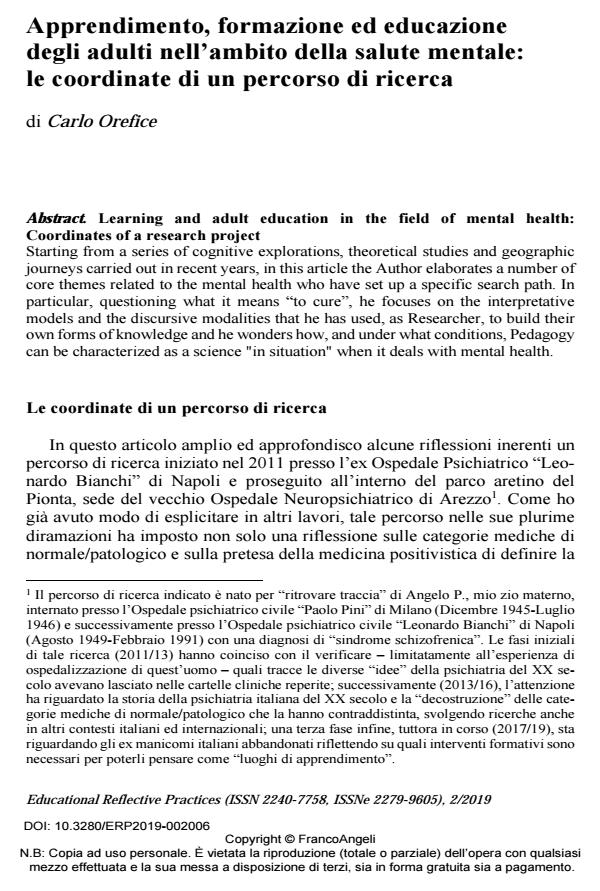Learning and adult education in the field of mental health: Coordinates of a research project
Journal title EDUCATIONAL REFLECTIVE PRACTICES
Author/s Carlo Orefice
Publishing Year 2020 Issue 2019/2 Language Italian
Pages 16 P. 98-113 File size 237 KB
DOI 10.3280/ERP2019-002006
DOI is like a bar code for intellectual property: to have more infomation
click here
Below, you can see the article first page
If you want to buy this article in PDF format, you can do it, following the instructions to buy download credits

FrancoAngeli is member of Publishers International Linking Association, Inc (PILA), a not-for-profit association which run the CrossRef service enabling links to and from online scholarly content.
Starting from a series of cognitive explorations, theoretical studies and geographic journeys carried out in recent years, in this article the Author elaborates a number of core themes related to the mental health who have set up a specific search path. In particular, questioning what it means "to cure", he focuses on the interpretative models and the discursive modalities that he has used, as Researcher, to build their own forms of knowledge and he wonders how, and under what conditions, Pedagogy can be characterized as a science "in situation" when it deals with mental health.
- Basaglia F. (1979). Le istituzioni della violenza. In: Basaglia F. (a cura di). L’istituzione negata. Rapporto da un ospedale psichiatrico. Torino: Einaudi (ed. or. 1968).
- Borgna E. (2014). La fragilità che è in noi. Torino: Einaudi.
- Canguilhem G. (1998). Il normale e il patologico. Torino: Einaudi (ed. or. 1966).
- Fabbri L. (1994). Ricerca pedagogica e pratiche educative. Per una pedagogia come scienza pratica. Napoli: TECNODID.
- Fabbri L., Melacarne C., Orefice C., Giampaolo M. (2016). “Se i medici sapessero, se i pazienti potessero”. Comunità di Pratiche di gestione della malattia oncologica. Educational Reflective Practices, 1: 116-137.
- Farmer P. (2003). Pathologies of Power: Health, Human Rights, and the New War on the Poor. Berkeley: University of California Press.
- Foucault M. (1971). L’archeologia del sapere. Milano: Rizzoli (ed. or. 1969).
- Foucault M. (2011). Storia della follia nell’età classica. Milano: BUR (ed. or. 1961).
- Freire P. (1973). L’educazione come pratica della libertà. Mondadori: Milano.
- Harré R. (1994). L’uomo sociale. Milano: Raffaello Cortina Editore (ed. or. 1979).
- Mezirow J. (2003). Apprendimento e trasformazione. Il significato dell’esperienza e il valore della riflessione nell’apprendimento degli adulti. Milano: Raffaello Cortina (ed. or. 1991).
- Orefice C. (2013). Per una pedagogia “di confine”. Decifrare differenze, costruire professionalità. Milano: Edizioni Unicopli.
- Orefice C. (2016a). Fomentar la investigación, la formación y el desarrollo de programas sobre el campo de la diversidad cultural: el Proyecto Europeo GOVDIV. In: Gervasi F. (coordinador). Diversidades. Perspectivas multidisciplinarias para el estudio de la interculturalidad y el desarrollo social. México: Ediciones Universidad Autónoma de Coahuila-DeLaurel, pp. 461-478.
- Orefice C. (2016b). Unicità e pluralità dell'essere corporeo. Educare alle differenze. In: Cunti A. (a cura di). Sfide dei corpi. Identità Corporeità Educazione. Milano: FrancoAngeli.
- Orefice C. (2017). I complessi manicomiali in Toscana: da “città dei matti” a luoghi di apprendimento per le Learning Cities. Riflessioni educative su una ricerca in corso. In: Baioni M. e Setaro M. (a cura di). Asili della follia. Storie e pratiche di liberazione nei manicomi toscani. Pisa: Pacini, pp. 182-192.
- Orefice C. (2018a). Il passato che produce valori: l’attualità pedagogica dei Chille. In: Pazzi di libertà. Il Teatro dei Chille a 40 anni dalla legge Basaglia. Pisa: Pacini, pp. 173-179.
- Orefice C. (2018b). The Experience of Things. Memory, Photographic Representation and Emotions in Psychiatric Field Research. In: dos Santos M., Pelletier J.F. (edited by). The Social Constructions and Experiences of Madness. Amsterdam: Brill Press, pp. 141-172.
- Orefice C. (2018c). Il rapporto tra spazi della cura, strategie di gestione organizzativa ed esperienze di malattia. Una ricerca nei presidi ospedalieri oncologici attraverso il Photovoice. In: Fabbri L. e Bianchi F. Fare ricerca collaborativa. Vita quotidiana, cura, lavoro. Roma: Carocci, pp. 105-125.
- Orefice C., Hummel I. (2019a). “THE HOUSE OF FOOLS”. Space, memory and urban regeneration in the context of the former Italian psychiatric hospital. Pisa: Pacini Editore (in pubblicazione).
- Orefice C., Bianchi F., Roberto S., Betti M. (2019b). Space, memory and urban regeneration: the case of the former psychiatric hospital of Arezzo and the park of Pionta. In: Baños J-E., Orefice C., Bianchi F., Costantini V. Good Health, Quality Education, Sustainable Communities, Human Rights. The scientific contribution of Italian UNESCO Chairs and partners to SDGs 2030. Firenze: FUP (in pubblicazione).
- Palidda S. Per una storia sociale e politica dell’internamento e dei suoi luoghi in Italia, comunicazione personale fornita a seguito del Convegno “La città degli specchi. Memorie dal manicomio” presso l’Università di Napoli Suor Orsola Benincasa - Facoltà di Scienze della Formazione (Napoli 7-8 Aprile 2016).
Carlo Orefice, Apprendimento, formazione ed educazione degli adulti nell’ambito della salute mentale: le coordinate di un percorso di ricerca in "EDUCATIONAL REFLECTIVE PRACTICES" 2/2019, pp 98-113, DOI: 10.3280/ERP2019-002006